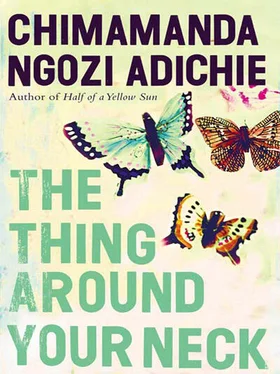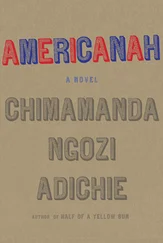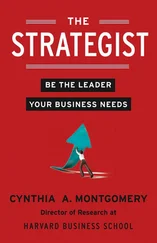The next day, they did not talk about the previous evening. They talked about how fluffy the scrambled eggs were and how eerie the jacaranda leaves that rustled against their windows at night were. After dinner, the Senegalese read from her story. It was a windy night and they shut the door to keep out the sound of the whirling trees. The smoke from Edward’s pipe hung over the room. The Senegalese read two pages of a funeral scene, stopping often to sip some water, her accent thickening as she became more emotional, each t sounding like a z. Afterwards, everyone turned to Edward, even the Ugandan, who seemed to have forgotten that he was workshop leader. Edward chewed at his pipe thoughtfully before he said that homosexual stories of this sort weren’t reflective of Africa, really.
“Which Africa?” Ujunwa blurted out.
The black South African shifted on his seat. Edward chewed further at his pipe. Then he looked at Ujunwa in the way one would look at a child who refused to keep still in church and said that he wasn’t speaking as an Oxford-trained Africanist, but as one who was keen on the real Africa and not the imposing of Western ideas on African venues. The Zimbabwean and Tanzanian and white South African began to shake their heads as Edward was speaking.
“This may indeed be the year 2000, but how African is it for a person to tell her family that she is homosexual?” Edward asked.
The Senegalese burst out in incomprehensible French and then, a minute of fluid speech later, said, “ I am Senegalese! I am Senegalese!” Edward responded in equally swift French and then said in English, with a soft smile, “I think she had too much of that excellent Bordeaux,” and some of the participants chuckled.
Ujunwa was the first to leave. She was close to her cabin when she heard somebody call her and she stopped. It was the Kenyan. The Zimbabwean and the white South African were with him. “Let’s go to the bar,” the Kenyan said. She wondered where the Senegalese was. In the bar, she drank a glass of wine and listened to them talk about how the other guests at Jumping Monkey Hill — all of whom were white — looked at the participants suspiciously. The Kenyan said a youngish couple had stopped and stepped back a little as he approached them on the path from the swimming pool the day before. The white South African said she got suspicious looks, too, perhaps because she wore only kente-print caftans. Sitting there, staring out into the black night, listening to the drink-softened voices around her, Ujunwa felt a self-loathing burst open in the bottom of her stomach. She should not have laughed when Edward said “I’d rather like you to lie down for me.” It had not been funny. It had not been funny at all. She had hated it, hated the grin on his face and the glimpse of greenish teeth and the way he always looked at her chest rather than her face, the way his eyes climbed all over her, and yet she had made herself laugh like a deranged hyena. She put down her half-finished glass of wine and said, “Edward is always looking at my body.” The Kenyan and the white South African and Zimbabwean stared at her. Ujunwa repeated, “Edward is always looking at my body.” The Kenyan said it was clear from the first day that the man would be climbing on top of that flat stick of a wife and wishing it were Ujunwa; the Zimbabwean said Edward’s eyes were always leering when he looked at Ujunwa; the white South African said Edward would never look at a white woman like that because what he felt for Ujunwa was a fancy without respect.
“You all noticed?” Ujunwa asked them. “You all noticed?” She felt strangely betrayed. She got up and went to her cabin. She called her mother, but the metallic voice kept saying “The number you are calling is not available at the moment, please try later,” and so she hung up. She could not write. She lay in bed and stayed awake for so long that when she finally fell asleep, it was dawn.
That evening, the Tanzanian read an excerpt of his story about the killings in the Congo, from the point of view of a militiaman, a man full of prurient violence. Edward said it would be the lead story in the Oratory , that it was urgent and relevant, that it brought news. Ujunwa thought it read like a piece from The Economist with cartoon characters painted in. But she didn’t say that. She went back to her cabin and, although she had a stomachache, she turned on her laptop.
As Chioma sits and stares at Yinka, settled on the alhaji’s lap, she feels as if she is acting a play. She wrote plays in secondary school. Her class staged one during the school’s anniversary celebration and, at the end, there was a standing ovation and the principal said, “Chioma is our future star!” Her father was there, sitting next to her mother, clapping and smiling. But when she said she wanted to study literature in university, he told her it was not viable. His word, “viable.” He said she had to study something else and could always write on the side. The alhaji is lightly running a finger over Yinka’s arm and saying, “But you know Savanna Union Bank sent people to me last week.” Yinka is still smiling and Chioma wonders whether her cheeks are aching. She thinks about the stories in a metal box under her bed. Her father read them all and sometimes he wrote in the margins: Excellent! Cliché! Very good! Unclear! It was he who had bought novels for her; her mother thought novels a waste of time and felt that all Chioma needed were her textbooks.
Yinka says, “Chioma!” and she looks up. The alhaji is talking to her. He looks almost shy and his eyes do not meet hers. There is a tentativeness toward her that he does not show toward Yinka. “I am saying you are too fine. Why is it that a Big Man has not married you?” Chioma smiles and says nothing. The alhaji says, “I have agreed that I will do business with Merchant Trust but you will be my personal contact.” Chioma is uncertain what to say. “Of course,” Yinka says. “She will be your contact. We will take care of you. Ah, thank you, sir!”
The alhaji gets up and says, “Come, come, I have some nice perfumes from my last trip to London. Let me give you something to take home.” He starts to walk inside and then turns. “Come, come, you two.” Yinka follows. Chioma gets up. The alhaji turns again toward her, to wait for her to follow. But she does not follow. She turns to the door and opens it and walks out into the bright sunlight and past the Jeep in which the driver is sitting with the door hanging open, listening to the radio. “Aunty? Aunty, something happen?” he calls. She does not answer. She walks and walks, past the high gates and out to the street where she gets in a taxi and goes to the office to clear out her almost-empty desk.
Ujunwa woke up to the crashing sound of the sea, to a nervous clutch in her belly. She did not want to read her story tonight. She did not want to go to breakfast, either, but she went anyway and said a general good morning with a general smile. She sat next to the Kenyan and he leaned toward her and whispered that Edward had just told the Senegalese that he had dreamed of her naked navel. Naked navel. Ujunwa watched the Senegalese, delicately raising her teacup to her lips, sanguine, looking out at the sea. Ujunwa envied her confident calm. She felt upset, too, to hear that Edward was making suggestive remarks to someone else, and she wondered what her pique meant. Had she come to see his ogling as her due? She was uncomfortable thinking about this, about reading that night, and so in the afternoon, lingering over lunch, she asked the Senegalese what she had said when Edward spoke of her naked navel.
The Senegalese shrugged and said no matter how many dreams the old man had, she would still remain a happy lesbian and there was no need to say anything to him.
Читать дальше











